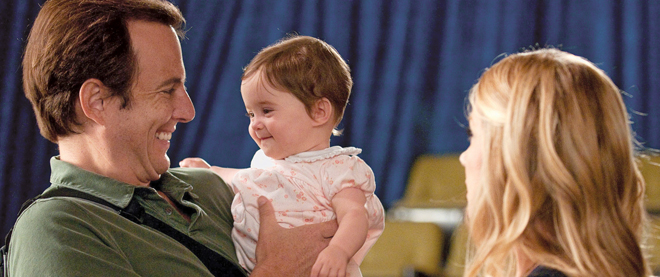Babies are taking over television
As actors, they’re notoriously obstreperous, but babies are television’s hottest stars
Colleen Hayes/Colleen Hayes/NBC
Share

Emily Spivey told critics that her new show, Up All Night, with Christina Applegate and Will Arnett as a hip couple trying to adjust to the challenge of raising a newborn, has a premise “straight out of my baby journal.” It sometimes feels like most shows this season are straight out of a baby journal. Television shows used to avoid babies if possible; Dawn Jeffory Nelson, a professional “baby wrangler” on movies like the new Harold & Kumar picture, told Maclean’s that babies are usually “relegated to the background,” or “they go up the stairs as babies, and they come down and they’re five.” But today, babies are taking over TV in a way that we haven’t seen since the Olsen twins were on Full House.
The story possibilities of babies seem to have fired the imaginations of writers like Spivey, who based her show on her own experience as a working mother. Producers are aware that a baby can add a new dimension to a show: Nelson says that on Dexter, a show she recently did some work on, the psychopathic title character’s baby son “is becoming an important aspect of Dexter’s character.” The family drama Parenthood has incorporated an adoption and a pregnancy, and creator Jason Katims told TV Line that “The baby arc is really interesting and will essentially last the whole season.” And Last Man Standing is supposed to be about Tim Allen’s relationship with his wife and daughters, but builds a number of plots around his attempts to impart manly values to his baby grandson.
Some of this baby mania may be due to what the Los Angeles Times has described as “the Modern Family effect.” Lily, the adorable baby adopted by the characters of Cameron (Eric Stonestreet) and Mitchell (Jesse Tyler Ferguson), had viewers all over the world cooing over her. Another show that has quietly proven the effectiveness of babies is Raising Hope, from My Name Is Earl creator Greg Garcia. The show, where the leads are in charge of raising a serial killer’s baby, has proven that the presence of a little girl can make abrasive characters more family-friendly.
The problem that such shows have to deal with, though, is that babies can’t actually act, and it’s impossible to script what they’re going to do. “You don’t know what you’re going to get with the baby,” Garcia told New Zealand’s TV3. “It’s going to decide.” Child labour restrictions—not to mention moral ones—also prevent them from doing much physical comedy: “You don’t want to scare people with the baby being in certain dangerous situations,” Garcia said. The result is that many baby characters lie there like props to be picked up by the adults. And yet a cute baby always gets the attention in a scene, which can be a source of frustration for actors. “If a baby is driving the show, the adults are at their mercy, and sometimes the adult actor is as well,” Nelson says. “The scene may stop cold because a baby is crying, or a baby has fallen asleep, or a baby’s diaper needed to be changed.”
Still, the presence of a baby can pay dividends at a time when there are more TV shows than ever, and producers need to find creative ways to get media attention. Modern Family got a lot of press coverage for its decision to recast Lily, originally played by twins, with one older child. Raising Hope countered by trumpeting its decision not to recast its baby (played by identical twins Bailey and Rylie Cregut), with Garcia even taking a shot at Modern Family’s baby twins in the process: “You can tell those little girls weren’t having fun. It just came across on screen.” It sometimes seems like a show can get more ink for baby-casting than for grown-up actors.
That could explain why the networks have other babies on the way, both in new shows and currently running ones: Bones is in the middle of a pregnancy arc, and Modern Family’s network is developing pilots like Stuck in Reverse, which New York magazine describes as the story of “a hippie mom reuniting with her working daughter to care for the latter’s new baby.” That means more shows are going to have to go out of their way to find what Nelson calls “a good working baby,” meaning “a pretty Zen baby, calm and unflappable.” The adults will also have to remain calm and unflappable while the babies steal their scenes.